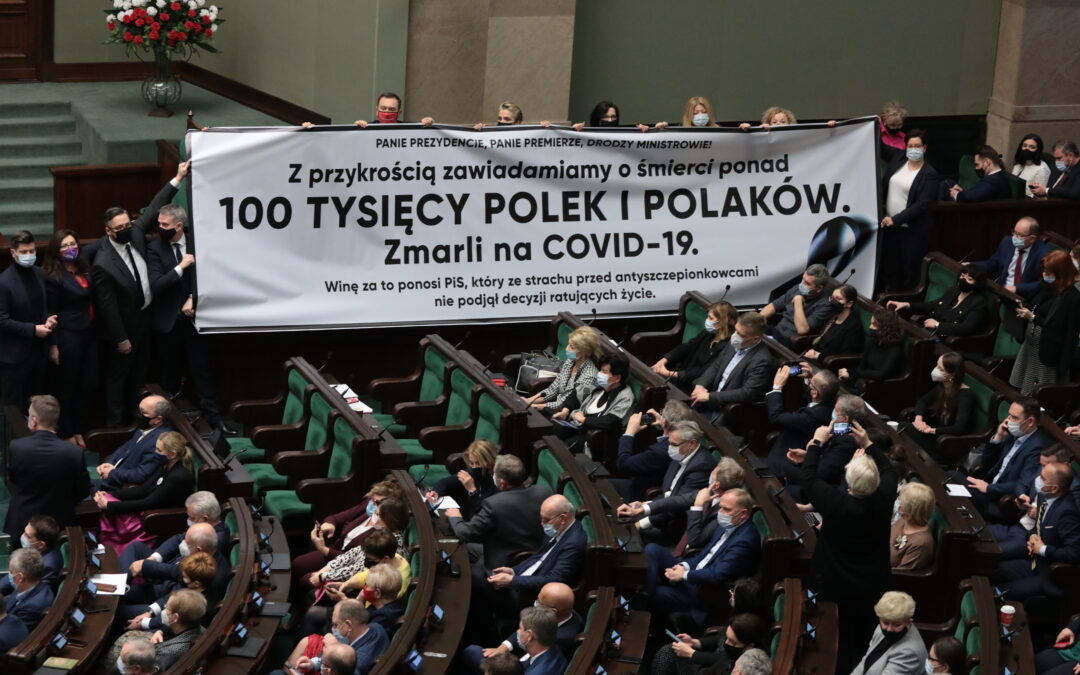Opposition MPs yesterday unfurled a banner mourning Poland passing 100,000 Covid deaths. They accused the government of being responsible for the scale of the tragedy, and of bowing to anti-vaccine sentiment.
Figures from the ruling national-conservative Law and Justice (PiS) party, however, criticised the opposition for politicising a tragedy.
On Tuesday this week, Poland became the 16th country in the world to pass the figure of 100,000 recorded Covid deaths. Among those countries, it has the third highest number of deaths in proportion to population.
Among the 16 countries to have reported over 100,000 Covid deaths, Poland has the third highest number of deaths in proportion to population, behind only Peru and Brazil.
You can explore the data here: https://t.co/4mwG4tcOJk pic.twitter.com/Lj8fMy9qHX
— Notes from Poland 🇵🇱 (@notesfrompoland) January 11, 2022
Yesterday, an MP from The Left (Lewica), Marcelina Zawisza, called for a bill to make vaccination against COVID-19 compulsory – which was proposed by her grouping, the third largest in parliament, in December – to be added to the legislative agenda.
On cue, Left MPs then unrolled a large banner – designed in the style of a death announcement – reading: “We regret to announce the death of over 100,000 Polish women and men.” In smaller print, it added: “The blame is on PiS, who from fear of anti-vaxxers did not take decisions that save lives.”
One of the MPs, Krzysztof Śmiszek, called 100,000 a “number of shame for the Polish government”, adding that a “gun was being held to the head of the leaders of PiS, put there by antivaxxers”.
Poland's second-largest opposition group, The Left, has proposed a law making Covid vaccines mandatory, with a fine for those who refuse https://t.co/0gMtkBcNj6
— Notes from Poland 🇵🇱 (@notesfrompoland) December 6, 2021
Władysław Kosiniak-Kamysz, who leads the centre-right Polish People’s Party (PSL), said the death figure was “a tragic record of the government’s failure to act decisively to combat the pandemic,” reports the Polish Press Agency (PAP).
He said that the government focused on informing people of daily statistics rather than “fighting” or “taking decisions”. “They are not even able to convince their own colleagues to promote vaccination,” he added, referring to the recent case of a school superintendent calling vaccines an “experiment”.
While the government has repeatedly encouraged people to vaccinate – and has offered incentives for them to do so – it has also has a handful of opponents of vaccination among its own MPs.
The Left’s actions in parliament were criticised by other PiS figures. One of the ruling party’s MPs, Justyna Borowiak, accused the opposition of “politicising the deaths of Poles”. “This is not an issue for political stunts,” said Borowiak. “Shame and disgrace!”
Similar accusations were made earlier this week against Donald Tusk, leader of the centrist Civic Platform (PO), the largest opposition party.
On Tuesday, Tusk announced that he and Rafał Trzaskowski – Warsaw’s mayor and PO’s deputy leader – would commemorate Poland’s 100,000 Covid deaths at the Tomb of the Unknown Soldier in the capital, a symbolic site of many state ceremonies.
“Today we should show our compassion and solidarity with all the suffering, the dead and their relatives,” he said, quoted by Interia.
Zadedykuję Panu słowa Donalda Tuska: „Wolałbym się nie urodzić, niż na grobach zmarłych budować swoją karierę polityczną.” pic.twitter.com/djpXyFaFoD
— Samuel Pereira (@SamPereira_) January 11, 2022
However, figures linked to PiS accused Tusk not only of exploiting a tragedy for political gain, but also of hypocrisy. Samuel Pereira, the head of state news website TVP.Info, noted that in 2012 Tusk had accused PiS of politically exploiting the Smolensk plane crash.
“I’d rather not be born than build my political career on the graves of the dead,” said Tusk at the time, referring to the crash that killed then President Lech Kaczyński, twin brother of PiS chairman Jarosław.
Main image credit: Sławomir Kamiński / Agencja Wyborcza.pl

Maria Wilczek is deputy editor of Notes from Poland. She is a regular writer for The Times, The Economist and Al Jazeera English, and has also featured in Foreign Policy, Politico Europe, The Spectator and Gazeta Wyborcza.




















